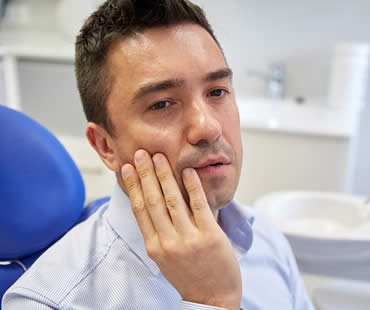
Nov 27, 2020 | Dental Topics 2, Root Canal Treatment, Blog
If you suspect you have an infected tooth, you might wonder if root canal treatment might be in your future. Do you have another option? Yes! One such alternative has been in existence for decades, but has only recently come to be more effective due to advancements in materials. This process is called pulp capping.
Pulp capping can help patients whose root infections have not yet reached the tooth’s nerve. Root infections begin when bacteria enters the pulp of the tooth through a crack or a large cavity. In a standard root canal procedure, the pulp and nerve of the tooth is hollowed out, cleaned and sealed, typically with a crown restoration.
With pulp capping, the nerve is preserved and the tooth is often repaired with a filling instead of a crown. Pulp capping allows the dentist to clean and protect the pulp, defending it from infection with medicine. With a successful pulp cap, the dentin of the tooth begins to regrow over the pulp cap. Advancements in the sealants used during these types of procedures has allowed for a greater percentage of success.
If you have a toothache, it’s important to see your dentist immediately. Pulp capping has a narrow window in which it can be performed. If your tooth is too infected, the pulp and nerve of your tooth may already be infected, and it’s too late for pulp capping to be effective.
A pulp cap is a far less invasive procedure than a root canal treatment or a tooth extraction, and there is less recovery time and tooth sensitivity following the treatment.
If you suspect you may have a tooth in trouble, talk to your dentist now. You might be able to save yourself a root canal treatment.
We treat patients from Central Falls and the surrounding area

May 28, 2021 | Dental Topics 2, Root Canal Treatment, Blog
If you are about to undergo root canal treatment to save a compromised tooth, your oral surgeon or dentist will likely provide you with a list of aftercare instructions. It is vitally important that you follow these recommendations to avoid complications and ensure the success of your endodontic treatment.
There are a few tips you can follow to speed up your recovery time, promote healing, and prevent serious dental problems and infections following root canal treatment:
- Do not chew on the treated side of your mouth until all of the numbness from the anesthetic has worn off completely.
- To manage swelling, apply an ice pack or bag of frozen peas on the treated area for thirty minutes. Repeat once an hour for about fifteen minutes each time until swelling subsides.
- For several nights after treatment, keep your head elevated while sleeping.
- Gently rinse your mouth with warm salt water regularly for the first few days after root canal treatment.
- Refrain from smoking for a minimum of 24 hours and try to curb tobacco usage as much as possible during the healing period.
- Avoid strenuous physical activity or exercise for 48 hours after your root canal procedure.
Contact your dentist immediately if you experience any excessive swelling or pain, the appearance of a rash or hives, or a return of original symptoms. By listening to the recommendations of your dentist, and following these extra tips, you can assure yourself the best chance of a rapid and complication-free recovery from root canal treatment.
We treat patients from Central Falls and the surrounding area

Jan 31, 2020 | Dental Topics 2, Root Canal Treatment, Blog
If you are dealing with ongoing tooth pain, you may be too fearful to go to the dentist to find out what’s going on. It’s important that you do, however, as you may need root canal therapy. Your dentist will need to evaluate you to see if that procedure is necessary, and will closely examine several factors: the signs the dentist can see personally, the results of any tests performed during your visit, and the symptoms you have been experiencing with the problematic tooth.
Your dentist may observe:
- A tooth that is discolored
- X-rays that reveal a tooth problem
- A fistulous tract, or persistent or recurring gum pimple
Additional testing done by your dentist:
- X-rays provide an extremely clear picture of the health of the tooth
- Thermal testing can evaluate sensitivity through a careful application of hot or cold temperatures
- Percussion testing evaluates pain response through gentle tapping
You may have been noticing:
- A broken or cracked tooth obviously decayed or damaged
- A discolored tooth, especially a grey tooth
- A “bubble” in your gums, like a pimple. It may or may not have ruptured, leaking pus that smells or tastes awful
- Pain that shoots out from one tooth to your jaw or ear, leading to earache symptoms
- Pain that prevents you from living your life without painkillers
- Pain, sensitivity or swelling on one certain tooth
- Extreme sensitivity to hot or cold liquids that lingers and is very painful
In some cases, an infected tooth that requires a root canal treatment has no symptoms at all that could be discerned by you. Only a dental professional can confirm the need to undergo root canal therapies. If you are experiencing pain that disrupts your life, talk to your dentist or endodontist immediately. Root canal treatments are designed to relieve the pain you’re experiencing now and to restore your tooth to full form and function. Don’t wait to get your life and smile back!
Our dental office is located in Central Falls

Sep 20, 2019 | Dental Topics 2, Root Canal Treatment, Blog
If the prospect of a root canal procedure has you running for the hills, you may want to consider reading over this list of frequently asked questions before you end up cowering in a corner:
- What is root canal therapy? Root canal treatment is performed when decay or trauma has damaged a tooth causing it to die. A dentist or endodontist performs a procedure to remove the diseased or damaged pulp from the tooth and then refills the tooth cavity.
- Is root canal therapy painful? In reality, root canal treatment is intended to relieve pain, not cause it. Because the procedures are very similar, you should experience no more discomfort than having a cavity filled.
- What happens after root canal therapy? Your tooth may be slightly sensitive for a few days, but over-the-counter pain relievers are usually sufficient to relieve any pain you may experience. In order for your tooth to return to full functionality, a crown or other restoration will need to be placed after the root canal therapy is performed.
- What if I opt not to choose root canal therapy? Untreated damage or infection in your tooth can travel through the roots and lead to an abscess or larger infection.
- Is there an alternative to root canal therapy? You could relieve the pain and infection by having your tooth removed. However, this can cause problems such as bone loss, migration of teeth, and bite problems.
In the case of a severely damaged or decayed tooth, the ideal solution is to save your natural tooth through root canal therapy and restoration. Contrary to popular belief, a root canal procedure is no more uncomfortable than having a filling placed in a cavity, and can have enormous benefits to your long-term oral health. Consult with your dental professional to get answers to any other questions or concerns you may have regarding root canal therapy so you can alleviate your fears and return to your healthy smile.
Schedule your appointment at our Central Falls dental office

Feb 26, 2021 | Dental Topics 2, Root Canal Treatment, Blog
If root canal treatment has been recommended for you, you’re probably a little nervous. Maybe you’re a LOT nervous, but if you’re thinking about putting off your treatment, don’t. If you need root canal therapy, the underlying conditions that necessitate it will not go away left untreated. In fact, they’ll just get worse and worse over time, causing you more pain and discomfort and potentially leading to more serious complications.
If you don’t treat the infection in your tooth, it will spread. Beginning at your tooth’s roots, it will travel to your jawbone and eventually to your healthy teeth. Your entire jawbone can be put at risk. By treating your infection promptly with root canal therapy, your mouth can be free of infection and you will begin the process of healing.
Serious diseases like heart disease and diabetes have been directly linked to gum disease. During pregnancy, many problems including low birth weight and premature birth can occur as a direct result of infection and bacteria in the mouth. Several types of cancers have all been shown to have a link to poor overall oral health. The mouth is truly the pathway for everything that goes into the body, and if it’s providing a steady stream of bacteria and infection to be spread throughout your body, it’s extremely problematic.
Don’t worry about pain following your procedure. Root canal therapies are meant to relieve pain, not cause it. You’ll be surprised how much better you’ll feel after your mouth is infection-free.
If you ignore your infected tooth for long enough, it may either fall out on its own or need to be extracted. Missing teeth come with a long list of oral issues, including difficulties with bite alignment and speech only corrected with some kind of dental restoration.
Don’t wait to have your root canal treatment. Don’t open yourself up to the myriad of consequences that could result from postponing treatment.
Our dental office is located in Central Falls

Mar 13, 2020 | Dental Topics 2, Root Canal Treatment, Blog
An aching tooth can make your life miserable. Pain, difficulty eating, inability to sleep, headaches and earaches are some of the problems that often accompany a toothache. If you have any of these symptoms and suspect a damaged tooth, a trip to the dentist is in order to see if root canal treatment might be needed.
What is root canal therapy? Although it has gotten a bad reputation over the years, it is the best way to save your tooth once infection has set in. The cause for the problem can vary, including deep tooth decay, a faulty crown, trauma, or repeated dental procedures. Once the inside of the tooth called the pulp becomes damaged, root canal treatment is the ideal solution. If you don’t seek treatment, severe pain and possible tooth loss may be in your future.
During root canal therapy, the damaged tooth pulp is carefully removed so that the interior of the tooth can be thoroughly cleaned and disinfected. Then the tooth is filled and sealed using a special material. Finally, the tooth is fully restored with a crown or filling to offer protection from future damage.
What are the positive outcomes of root canal treatment? First, it gives you back the complete function and natural appearance of your real tooth. You avoid getting a hole in your smile or needing a procedure like a dental implant. Root canal treatment restores your normal sensation and biting force, providing for efficient and painless chewing. This treatment also protects other teeth from receiving excessive wear, since your real tooth remains in place and able to take its fair share of tooth wear. Of course, treatment will also relieve the pain and other symptoms associated with your damaged tooth.
Root canal treatment is usually quite simple when performed by a qualified dental professional. Modern techniques allow the process to be as comfortable as just getting a normal filling. The procedure may be completed in only a couple of appointments and the end result will be a long-lasting, healthy tooth.
We look forward to seeing you in our Central Falls dental office








